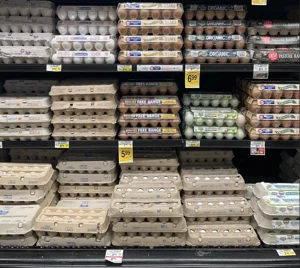Tension filled the room at the U.S. House Agriculture Committee hearing Wednesday morning as representatives debated the ramifications of California’s Proposition 12 on farmers and consumers nationwide.
The committee discussed the proposition’s national effects on the cost of pork, veal and eggs and agricultural production. The hearing comes after the Trump administration sued California for its regulations of eggs, claiming three state laws — Prop. 12 included — are contributing to the increase in prices.
Under Prop. 12, farmers nationwide face requirements for raising pigs, calves and chickens if they want to sell their products in California. The initiative was approved by voters in 2018 and went into full effect in 2024.
During the hearing, various Agriculture Committee members voiced opposition and support for Proposition 12.
Opponents on the panel claimed the law is raising prices nationwide because farmers in other states are spending money to rebuild their facilities to meet Prop. 12 standards. They also argue the state law has not achieved its main purpose: protecting animals’ health.
“When I visited family farms in my district, they noted that the system has caused increased stress, injury for the animal, mortality, while limiting individualized animal care,” U.S. Rep. Randy Feenstra, R-Indiana, said during the hearing.
Matt Schuiteman, a farmer and a board member at the Iowa Farm Bureau, told the House committee that Prop. 12 forces farmers to care for their animals in a way that leaves them worse off. He noted farmers have first-hand knowledge that the politicians who crafted the initiative lacked.
“What Proposition 12 does is it takes away our ability to act on what we know is for the best interest of the animal,” Schuiteman said. “Maybe it has been settled in other places, but it has not been settled in Iowa, and we would prefer to have the freedom to manage our animals the best way we can see fit, for the best possible outcome.”
The Center for Environment and Welfare, a private think tank involved with animal welfare and environmental issues, told The Center Square Wednesday it agreed with claims accusing Prop. 12 of harming animals.
“The animal activists say Proposition 12 would be better for the animals, but that’s not necessarily true in all cases,” William Coggin, the center’s research director, said. “It has taken tools away from farmers and veterinarians.”
U.S. Rep. Jim Costa, D-California, who supports Proposition 12, blamed tariffs and other elements for raising prices.
“Tariffs are a tax on American consumers, American producers, American agricultural producers, and that leads to higher food costs,” Costa said during the hearing.
Supporters of Proposition 12 noted the initiative was passed by California voters. Therefore, they said, if Congress tried to overrule the law by passing its own bill, that would interfere with the will of the people.
The Center for Environment and Welfare, however, released a poll that showed 44% of California voters, a plurality, said they would not vote for Proposition 12 if it were on the ballot tomorrow. A majority of the poll’s respondents — 60% — said they supportied the state Legislature modifying Prop. 12 to reduce prices. The survey polled 458 registered voters.
Farm Action Fund, a nonpartisan organization, supports Proposition 12 and sent a letter to the House Agriculture Committee Wednesday, thanking members who support the initiative and urging the panel to reject efforts to overturn it. The letter was signed by independent hog farmers from a Farm Action Fund network.
Farmers made a choice to comply with Prop. 12, Joe Maxwell, the president of Farm Action Fund, told The Center Square Wednesday
“Proposition 12 did not mandate a Missouri farmer, or an Illinois farmer, or an Iowa farmer, to comply,” Maxwell said. “It just said if your pork is going to be sold in California, it must comply. Farmers that voluntarily wanted to comply, spent the money to do so.”
The Center for Environment and Welfare, on the other hand, said it believes California has the right to pass regulations only affecting farmers in California, not those in other states.
Patrick Hord, vice president of the National Pork Producers Council, testified at the hearing that it was not a viable or wise decision for states to not supply pork to California. The state produces only 0.1% of the nation’s pork, but consumes 13%.
Therefore, producers in other states must sell pork in California to meet the demand, Hord said.
“It would be really detrimental to us as pork producers and the pork chain to not supply that,” Hord said during the hearing. “In reality, it’s forcing the rest of the states to comply in order to raise that product for California.”






